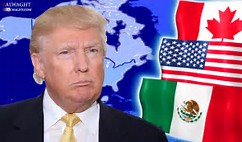By James Bruner
As President Trump approached the 100-day mark, he checked another campaign pledge off the list: to renegotiate NAFTA.
Wednesday (April 26th) was a busy day for the White House. It all started when Politico reported that a draft Executive Order (EO) to withdraw from NAFTA was circulating the White House that morning. According to Politico, the hypothetical EO drafted by chief strategist Steve Bannon and National Trade Council head Peter Navarro “alarmed Republicans… with some lawmakers warning that such a move would be a “disaster.”
Politico went on to acknowledge that the draft order “could be a hardball negotiating tactic designed to bring Mexico and Canada to the table to renegotiate NAFTA.” Bannon, a self-described “economic nationalist” and Navarro a strong critic of U.S. trade deficits may have planned it that way or maybe not. In any case, it appears to have worked.
Within hours, the heads of Canada and Mexico were on the phone with Trump. According to the White House, the leaders agreed to “proceed swiftly” and “enable the renegotiation of the NAFTA deal.”
The following morning, Thursday, Trump confirmed his intention to renegotiate the deal “subject to the fact that if we do not reach a fair deal for all, we will then terminate NAFTA.” On CNBC, Commerce Secretary Wilbur Ross was asked to clarify the administration’s position. Secretary Ross confirmed the many “conceptual flaws” with the deal and called on congress to formally begin the negotiation process by issuing the requisite 90-day notice letter.
Many reports suggested Trump was walking back his remarks from the campaign trail when in a debate with Hillary Clinton, Trump called NAFTA “the single worst trade deal approved in this country.” The White House and Trump supporters marked the move as a win and another fulfilled pledge from the Trump’s 100-day action plan – contract with the American Voter: “I will announce my intention to renegotiate NAFTA or withdraw from the deal”.
Floridians should pay particularly close attention to NAFTA negotiations, according to Florida Agricultural Commissioner Adam Putnam. Putnam, who announced his bid for governor on May 1, has been very vocal against NAFTA, even before the recent announcements of renegotiation.
In a letter dated April 19th to U.S. Commerce Secretary Wilbur Ross, Putnam wrote “I urge you to initiate an investigation into Mexico’s unfair trade practices, which have allowed Mexican producers of specialty crops to become the dominant supplier of specialty crops into the U.S. market … These unfair trade practices have resulted in the continued decline of domestic production of these crops…”
In November, following Trump’s victory, Putnam had this to say: “It’s no secret how devastating NAFTA’s been to Florida agriculture… The entire tomato industry has realigned and very much is a shadow of its former self.”
More recently, in March at Plant City’s Strawberry Salute Breakfast, Putnam again blamed NAFTA for its impacts on Florida’s farmers: “It has been a brutal year for growers of vegetables and strawberries, and the common theme is Mexico,” he said. “It has devastated Florida agriculture.”
Putnam’s timely letter to Commerce Secretary Ross was likely well-received. On May 1, the same day Putnam announced his bid for Governor, Secretary Ross appeared on CNBC to shed more light on White House trade policies. Ross again blasted the “ancient” trade deal claiming “neither our economy nor the Mexican nor the Canadian economies are remotely similar to what they were back when the deal was done [in the 1990s].”
With so much at stake for small businesses, U.S. trade policies like NAFTA are sure to be hot-button issues in the Florida Governor’s race. Adam Putnam joins Tallahassee Mayor Andrew Gillum and Orlando businessman Christopher King in the growing field for the 2018 race. Former congresswoman Gwen Graham also announced her candidacy on May 1 with more candidates projected to announce this year.
James Bruner is a freelance investigative researcher and journalist. A Tallahassee native, James graduated with honors from Florida State University with a degree in political science and international affairs.


Thank you Trump! When NAFTA was negotiated, Florida vegetable growers got the shaft as Mexico flooded the market with vegetables. These imported vegetables were and are not grown under the same constraints placed upon Florida growers by the United States Government. Eat Florida grown vegetables!